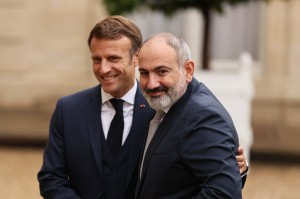 Armenian Prime Minister Nikol Pashinyan seeks a new path forward following Azerbaijan’s seizure of Nagorno-Karabakh and the radical shift in regional dynamics in the South Caucasus. His initiatives aim to revitalize Armenia and resolve longstanding issues, forging a new regional posture. However, domestic divisions and external challenges complicate his efforts. Azerbaijan has not responded to his calls for alternative cooperation while he remains skeptical of Azerbaijan’s overtures. Therefore, Pashinyan prefers to deal with Armenia’s domestic priorities and move carefully towards regional cooperation.
Armenian Prime Minister Nikol Pashinyan seeks a new path forward following Azerbaijan’s seizure of Nagorno-Karabakh and the radical shift in regional dynamics in the South Caucasus. His initiatives aim to revitalize Armenia and resolve longstanding issues, forging a new regional posture. However, domestic divisions and external challenges complicate his efforts. Azerbaijan has not responded to his calls for alternative cooperation while he remains skeptical of Azerbaijan’s overtures. Therefore, Pashinyan prefers to deal with Armenia’s domestic priorities and move carefully towards regional cooperation.
After the loss of Nagorno-Karabakh, Armenia has sought to establish a new political discourse in the region. This shift follows decades of isolation due to the Karabakh conflict, which excluded Armenia from regional projects and subjected it to significant Russian influence on the political front. Armenia is a member of the Commonwealth of Independent States (CIS), the Collective Security Treaty Organization (CSTO), and the Eurasian Economic Union (EEU) and has had a limited ability to formulate independent policy due to Russia’s restrictive influence. However, this dynamic started to shift after Pashinyan became Prime Minister and especially after the defeat in the Second Karabakh War, marking a potential turning point for Armenia’s regional posture.
Pashinyan’s tilt towards Western countries was reinforced by Russia’s failure to support Armenia during the war in Karabakh. This was received negatively by the Armenian government and public, who felt that there was no point for the country in takin part in the Russian-led organizations. Therefore, a search for a policy independent of Russia in order to establish Armenia’s real place in the region began. As Russia’s focus on its war in Ukraine changed regional dynamics, Armenia acquired increased room for maneuver.
Pashinyan’s harsh criticism of Russia and his openly anti-Russian stance, especially within the CSTO, have been determining factors in this process. The government decided to increase the military budget to US$ 1.4 billion in a process that included the purchase of air defense systems and missiles from France. Subsequently, the signing of a strategic partnership agreement with Georgia and the offer to Azerbaijan of a non-aggression pact demonstrate Armenia’s seriousness in this regard. In addition, Pashinyan’s proposal to amend the constitution also indicates a desire for radical change. However, doubts remain that the steps taken will lead to concrete results. In particular, the different expectations of Azerbaijan and Armenia prevent the two countries from establishing a regional peace.

 Şubat 28th, 2024
Şubat 28th, 2024  oztarsu
oztarsu  Posted in
Posted in  Tags:
Tags: